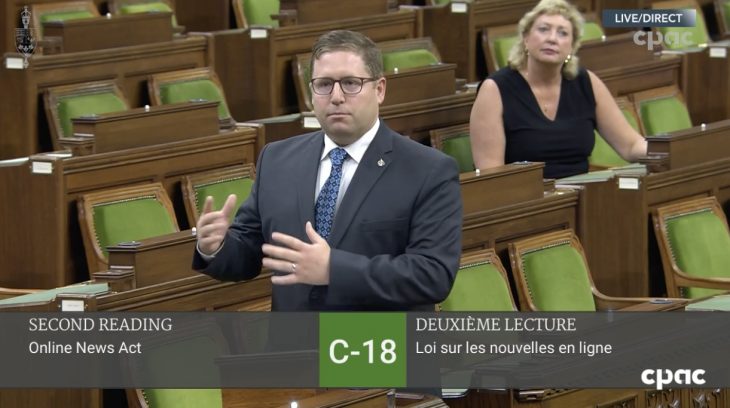
OTTAWA – Conservative critic John Nater (above) called into question the CRTC’s ability to effectively fulfill the responsibilities that would be handed to it by Bill C-18, the Online News Act, during second reading of the bill, which began today in the House of Commons.
Nater more specifically asked why the Commission was selected “to enforce and oversee the act when the CRTC does not have a history or experience in regulating online platforms.”
The Conservative critic further questioned the Commission’s suitability for the role by pointing to its chair Ian Scott’s “clear lack of judgement” when meeting Bell executive Mirko Bibic for beers and drawing attention to the fact the Commission still has not implemented a three-digit suicide prevention hotline despite the House having passed a motion over 500 days ago calling for one.
Nor has the CRTC issued a decision on the CBC’s licence renewal despite holding public hearings for it over 16 months ago, Nater said, asking: “If the CRTC cannot make a decision within 16 months on what I would assume to be a fairly routine renewal, how in the world can they have the capacity and competency to do anything that would be new that is asked of them?”
Nater further noted his disappointment regarding one decision the CRTC has made recently – the Rogers/Shaw decision.
“What I found interesting and frankly disappointed about the Rogers/Shaw decision by the CRTC was their use of wishy-washy non-committal language,” he said. “In their report, in their decision, they used words like “encouragement”, “expectations”, and “reminders” rather than CRTC actually taking a real stand.”
While noting the Conservatives support fair compensation for news organizations for their content, Nater also raised several other questions about Bill C-18, including why the public broadcaster was included and if more or less revenue would be generated from it than the $8.5 million Budget 2022 allocates to implement it. He also questioned whether the bill will help news organizations in small communities at all.
The Conservative critic ultimately asked for an amendment to the motion for second reading that would see the bill withdrawn and its subject matter sent to the Heritage Committee.


